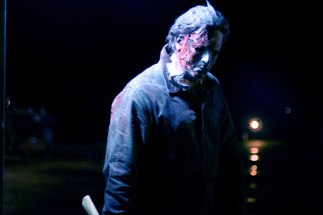Hollywood Psych
By Sean Collier
September 3, 2009
BoxOfficeProphets.com

Zombie's film is the second Halloween since the series hit the reset button. The Final Destination, while not strictly a relaunch, is ten years removed from the original film, with no crossover characters or direct connection to the preceding films. This is part of a long-standing trend; horror heavyweights Friday the 13th and Texas Chainsaw Massacre have both been successfully restarted, and A Nightmare on Elm Street is next. En masse, the juggernauts of long-running horror have decided to start from square one.
One motivating factor here, surprisingly enough, is an artistic one. The '90s saw the enduring horror series turn downright silly. Michael Myers had been converted into a vengeful druid before being defeated (on webcast) by Busta Rhymes. Jason had gone into space, become partially Cyborg, and won a dreamland battle with Freddy Krueger. And the less said about Leatherface's drag queen turn, the better.
These films had reached a tipping point, where even long-term fans were no longer willing to go along with increasingly ridiculous plots. Jason X (the one in space) only managed to scrape together $13.1 million domestically; Halloween Resurrection barely limped to $30 million on the strength of an October re-release. The total revenue from Texas Chainsaw Massacre: The Next Generation was $185,898.
All of these franchises had relaunches that reduced comic elements of the franchise, made their villain into more of a monster, and presented a grittier, more lifelike reality than the cartoonish '90s entries. Perhaps terming these remakes "artistic" moves is a bit of a stretch, but at the very least, they added a sense of seriousness that had been abandoned by previous iterations, for better or worse.
So far, this has proven to be a profitable move. February's Friday the 13th pulled in $90 million, more than any previous effort from Jason and his rotating cast of teenagers (discounting the Freddy vs. Jason crossover film.) Rob Zombie's Halloween had the highest gross of any film in the series; the same is true for 2003's Texas Chainsaw Massacre, which doubled the worldwide take of the entire franchise before it combined.
Clearly, audiences turn out for these restarts. What remains to be seen, however, is if these represent the last ounce of strength these tired franchises have, or if taking it from the top can prolong a series' life indefinitely. The Texas Chainsaw franchise had a second post-restart entry, 2006's Texas Chainsaw Massacre: The Beginning. While profitable, it didn't make half what the 2003 straight remake did.
Halloween II may be a good indication of the prospects of sequels-to-remakes. It's not a big deal that Zombie's second effort with Michael Myers lost out to The Final Destination; the latter film is riding a wave of extra attention due to its employment of the Real D technology, and that added buzz was almost certainly going to fell Halloween II. Furthermore, Zombie's movie made a respectable $17 million in the opening frame; this is more than Halloweens 3-6 made total, respectively.
If Michael Myers shows decent (invincible undead) legs, and Halloween II ends up within striking distance of the 2007 Halloween's domestic total of $58 million, we could be seeing a lot more of Michael, Freddy, Jason, Leatherface, and whoever else is waiting in the wings (Pinhead? Chucky? Candyman? Dear god, Leprechaun?)
If Halloween II quietly bows out in the $20-$30 million range, however, it may be the case that interest in these franchises was finally exhausted by the remakes. We've already followed these killers through ten films apiece, and shown up when studios called a mulligan; how much more can we care? Fifteen years from now, will we being seeing second relaunches after the remade sequels themselves head too far afield? If the money's there, yes. If not...well, DVD box sets always sell well.